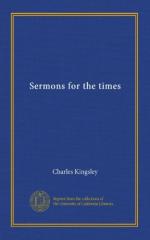His own forgiveness, and tells men what He has actually
done, and bids His apostle declare boldly that baptism
doth now save us, then man is frightened at the vastness
of God’s generosity, and thinks God’s grace
too free, His forgiveness too complete; and considers
this text and many another in the Bible as ‘dangerous’
forsooth, if it is ’preached unreservedly,’
and not to be quoted without some words of man’s
invention tacked to it, to water it down, and narrow
it, and take all the strength and life out of it;
and if he be asked whether he believes the words of
Scripture,—for instance, whether St. Paul
spoke truth when he told the heathen Athenians that
they and all men were the offspring of God;—or
when he told the Romans that as by the offence of
one, judgment came on all men to condemnation, even
so by the righteousness of One, the free gift came
upon all men to justification of life;—or
when he told the Corinthians, that as in Adam all
die, even so in Christ shall all be made alive;—or
whether St. Peter spoke truth when he said, that ’baptism
doth also now save us,’—then they
answer, that the words are true ‘in a sense;’
that is, not in their plain sense; true, if they were
only true; true, and yet somehow at the same time
not true; and not to be preached ‘unreservedly:’
as if man could be more cautious and correct in his
language than the Spirit of God, who inspired the Apostles;
as if man could be more careful of God’s honour
than God is of His own; as if man could hate sin and
guard against sin more carefully than God Himself.
Just in the same way do people stumble at certain
invaluable words in the Church Catechism, which teach
children to thank God for having brought them into
that state of salvation. Even very good people,
and people who really wish to believe and honour the
Church Catechism, and the Sacrament of Baptism, find
these words too strong to please them, and say, that
of course a child’s being in a state of salvation
cannot mean that he is saved, but that he may be saved
after he dies.
My friends, I never could find that we have a right
to take liberties with the Bible and the Prayer Book
which we dare not take with any other book, and to
put meanings into the words of them which, in the
case of any other book, would be contrary to plain
grammar and the English tongue, if not to common sense
and honesty.
If you say of a man, ‘he is in a state of happiness,’
you mean, do you not, that he is happy now, not that
he may perhaps be happy some day? If you came
to me and told me that you were in a state of hunger,
you would think it a very strange answer to receive
if I say, ’Very well then, if you become hungry,
come to me, and I will feed you?’ You all know
that a man’s being in a state of poverty, or
of misery, means that he is poor or miserable now,
here, at this very time; that if a man is in a state
of sickness, he is sick; if he is in a state of health,
he is healthy. Then what can a man’s being




